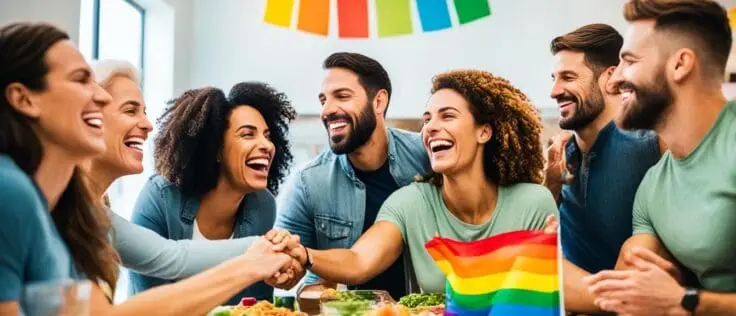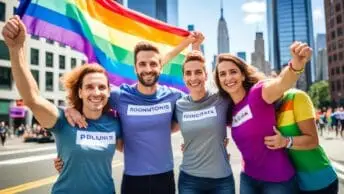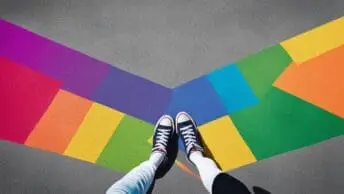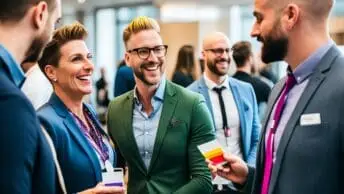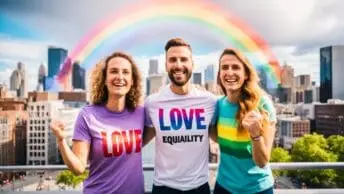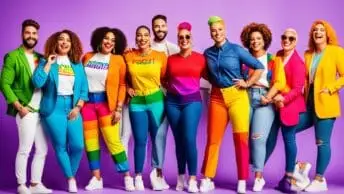Is your event planning inclusive or just touching on diversity? Society is changing. More people openly identify as LGBTQ+. It’s key for event planners to create spaces that are welcoming and truly inclusive. It’s about making inclusivity a part of your event’s fabric, all year round.
Creating LGBTQ+ friendly events isn’t just for show. In 2022, over 7% of American adults were LGBT. This number jumps to nearly 20% among Gen Z. With rising anti-LGBTQIA+ laws and views, safe, comfy, and welcoming spaces have never been more important.
Start by finding LGBTQ+ friendly venues and suppliers. Check the Human Rights Campaign’s State Equality Index for venues that truly back LGBTQ+ rights. This includes having gender-neutral toilets. It’s also key to use inclusive language and have various options on registration forms. This shows you recognise everyone’s identity.
Having a clear code of conduct is crucial. It should ban any anti-LGBTQ+ language or actions. This shows your event is about real inclusivity, not just surface-level support.
By following these practices, event organisers can create an environment that champions diversity. This helps bring different people together. It strengthens community bonds and gives everyone a sense of belonging.
Understanding the Importance of Inclusivity in Event Planning
Inclusivity in event planning is crucial. It makes sure everyone feels respected and valued. This is especially important for the LGBTQ+ community. With rising anti-LGBTQIA+ laws and attitudes, creating a safe space at events is vital.
A lot of people, 87% of them, think diversity and inclusion are key when choosing events. And, 72% of event organisers say these factors are essential for success. Also, with most people attending events to network, an inclusive atmosphere can boost participation.
It’s vital to consider the needs of all attendees, as 15% of the world’s population has disabilities. A good 65% of people prefer events that are accessible to everyone. Event planners should also embrace cultural diversity. This could increase participation by 82% and satisfaction by 70%.
Using varied imagery and language matters a lot, according to 71% of event planners. Having a range of speakers can attract more people. This could lead to a 55% jump in attendance. Organisations like the Event Leadership Institute offer diversity training.
Having strict rules against discrimination is key. A whopping 94% of event planners believe in having a code of conduct. This makes sure every participant feels safe and welcomed.
Choosing LGBTQ+ Friendly Venices
When planning an event for everyone, picking the right venue is crucial. Look for places known for welcoming the LGBTQ+ community. They often have policies and a history that show their commitment to inclusivity.
Some venues stand out because they score high on the Human Rights Campaign’s State Equality Index. They might offer gender-neutral bathrooms. This important feature helps trans, non-binary, and genderqueer guests feel safe and valued.
It’s also vital to train staff on gender fluidity and how to interact respectfully. Well-informed staff can make sure everyone feels included. Teaming up with LGBTQ+ leaders can further show the venue’s support for the community.
Look for places that support the LGBTQ+ community all year, not just during Pride Month. Avoid venues that practice pinkwashing. True, consistent support builds trust with LGBTQ+ people.
The economics of being inclusive cannot be ignored. The Swedish Federation of Business Owners reports that LGBTQ+ people globally have a buying power of $15 billion USD. In the US, this is about $1 billion USD. Appreciating the LGBTQ+ market can make a venue more successful.
Offering an inclusive space is both the right and smart thing to do. With the LGBTQ tourism market in Europe worth over €64 billion, catering to this demographic is essential.
To sum up, selecting queer-friendly venues is key for inclusive events. By focusing on true inclusivity and respect, event organisers can guarantee positive experiences for everyone.
Creating an Inclusive Registration Process
Making event registration welcoming for LGBTQ+ people is crucial. Planners can offer gender-neutral forms. This makes everyone feel respected and included. It’s key to skip unnecessary gender questions or to have lots of options and a write-in space.
Offering the choice of pronouns on name badges is also important. At the AusPATH 2022 Conference, there was an option for this. Adding pronouns and gender-neutral titles on badges greatly helped make things more inclusive.

The ICPS 2022 focused on including more women and students too. This showed a strong commitment to diversity. Such actions set a great example. They show how to make registration more inclusive from the beginning.
Inclusive practices increase participation too. The AGOSCI National Conference made documents easier to read and facilities more accessible. This led to more satisfied attendees. Embracing these practices creates a welcoming space. It boosts involvement and makes everyone feel they belong.
Developing a Code of Conduct
An effective code of conduct ensures events are welcoming and inclusive. It sets clear expectations for behaviour and language. This involves training, enforcement, monitoring, and updating policies.
Codes of conduct should be easily found and seen by everyone. They are best made with input from diverse teams. This ensures they represent everyone’s values and prevent discrimination.
The code outlines specific values to guide actions in line with the event’s goals. A strong stand against discrimination is crucial. Everyone must know and follow these rules, including legal requirements.
Reporting systems should allow anonymous submissions to protect those reporting issues. Regular check-ins ensure any problems are handled properly. The policy also covers behavior at social events, ensuring a safe environment everywhere.
An anti-harassment policy is key for addressing issues and informing employees of their rights. Penalties for breaking the rules need to be clear with examples to show they are serious.
Legal advice is important to avoid risks related to harassment. A good code of conduct sets a professional standard. It fosters respect and a positive environment, making events better for everyone.
Events with a Diverse Speaker Lineup
Having a range of speakers at events is key. This is because 35-40% of events didn’t have a Black speaker four years ago, says EventMB. Adding diverse speakers improves the talks and shows we care about including everyone. In 2020, Forbes revealed two-thirds of speakers were men, showing we need to change.
Event planners should look wider for speakers. The Black Speakers Network has over 10,000 Black speakers. Innovation Women connects you to women experts without taking their fees. The Diverse Speaker Bureau helps include voices from groups often overlooked, making events more representative.
Choosing speakers fairly matters. Planners must avoid just ticking boxes, aiming for real diversity. Shine Bootcamp started in 2017 to tackle the issue of all-male panels, focusing on women, including those of colour. True diversity means including many different groups, like LGBTQIA+, disabled people, Indigenous Peoples, and those for whom English is a second language.
Diverse events bring big benefits. Partnering with groups like Women and Color and Women Talk Design helps. Supporting new speakers and paying them fairly is key to lively and respectful events. Investing in diversity makes events better for everyone involved.
Training Your Event Staff for Inclusivity
To make your event truly inclusive, it’s key to train your staff well. They should learn about gender fluidity to respect everyone. This kind of training breaks down biases and builds a welcoming culture.
Having a diverse team means getting a range of creative ideas. It makes the event feel more inclusive. You can use surveys to see where more training is needed, especially on gender fluidity.

Inclusivity training teaches staff how to make events better for everyone. Using real examples, it shows how being inclusive is good for business. It makes attendees feel safe and welcome, too.
This training also focuses on how we talk and communicate. By using gender-neutral words, we can measure progress. Working with a variety of speakers and performers makes events richer in perspective.
By investing in inclusivity training, your staff create a kind and successful event. This welcomes everyone, making the event a better experience for all.
Marketing and Promoting LGBTQ+ Inclusive Events
Effective LGBTQ+ event marketing shines a light on inclusivity. Around 5% of the global population identifies as LGBTQ+. In some big cities, this number can jump to 15%. It’s important to show this inclusive message in all event promotions.
A top method for promoting inclusivity is to display diversity in event ads. Ads should show people of different races, genders, and sexual orientations. This makes the commitment to LGBTQ+ inclusion real and avoids just adding rainbows without substance.
Working with LGBTQ+ groups and influencers helps too. These partnerships show strong community support. They draw in a wider audience. Making the event a no-go zone for any hate ensures everyone feels safe.
Event messages must also embrace everyone correctly. This means using the right gender pronouns and providing gender-neutral facilities. These steps make events more inviting for LGBTQ+ attendees.
Using these strategies makes the inclusivity message resonate. It helps create events that are not only engaging but respectful to all.
Designing Gender-Neutral Name Badges
Making inclusive events means looking at small details. Gender-neutral badges are vital for an inclusive vibe. Marks & Spencer have led by adding optional pronouns on their staff’s badges. This shows us how important it is in places like shops and schools to make everyone feel welcome.
Adding pronouns to name badges does more than we think. It helps people meet and talk more easily at events. Also, using pronouns like ‘ze’ and ‘zir’ is getting popular, especially for those who don’t fit traditional gender boxes.
When bosses and groups use pronoun badges, they craft spaces that respect all gender identities. This includes transgender, non-binary, and many others. Such badges stop mistaken gender assumptions which can make folks uncomfortable.
Here are some numbers: 68% of LGBTQ+ people feel uneasy when others get their pronouns wrong. Meanwhile, 82% of nonbinary individuals feel better when the right pronouns are used at work. Adding these pronouns on badges can make employees up to 40% happier and more engaged.
Pronoun badges also start important talks on gender identity. They help get rid of stereotypes and build understanding. When companies combine badge changes with training about pronouns, they see a big drop in wrong gender assumptions and unfair treatment.
Setting Up Inclusive Signage
In 2024, inclusivity stands out as a key issue in planning events. Every attendee should feel respected and included. Respectful signage at the event is vital to make everyone feel welcome.
Event signs must have high colour contrast and big fonts for those with visual impairments. This makes sure everyone can read them easily. Accessible locations like gender-neutral toilets and entry points should be clearly marked.
Inclusive signage shows the event cares about diversity. Using gender-neutral language in signs creates a friendly space. Signs that encourage using the right pronouns can help in respecting each other.
LGBTQ+ friendly signs show the event’s commitment to inclusivity. These help everyone find their way around while feeling safe. Such an approach ensures that all participants feel valued and stay engaged.
Providing Feedback Opportunities
Giving event feedback chances is key to making events more inclusive. Organisers work hard to make safe, inviting spaces for everyone. Using post-event surveys to collect thoughts is crucial. It’s best to ask for feedback right after the event. This way, the memories and thoughts of the attendees are still clear.
Surveys should be short, taking 5-10 minutes to finish. They should mostly have multiple-choice questions and rating scales. This makes them easy to fill out. To get more people to answer, offer things like discounts, prizes, or special experiences.
Using tech can make getting feedback easier. Digital surveys, event apps, and emails can help. They provide quick reporting and personal invites, which boosts responses. Tools like what MeetingPulse offers let attendees give feedback quickly and easily.
It’s vital to look closely at the feedback. Grouping answers and spotting trends helps find important insights. Responding to feedback helps organisers see what to improve for the next event. This way, events keep getting better and more inclusive.
For good inclusivity assessment, tailor surveys to what attendees like. Use fun quizzes and games to make engagement interesting. Tell people why the survey matters, use many ways to reach them, set a deadline, and offer incentives. This ensures a lot of feedback is collected.
Getting feedback while the event is happening is very useful too. Use live polls, feedback stations, and staff to collect thoughts right then. Watching how attendees feel and act through tech like wearables and facial recognition gives extra insight.
Promoting a culture that values feedback is essential. Feedback helps make events better over time. By focusing on this, organisers show they care about making events welcoming for everyone.
Conclusion
Writing a conclusion can be tough for many. Yet, by restating the thesis and supporting points, closure is achieved. Organising LGBTQ+ events demands careful planning and dedication to diversity.
For a LGBTQ+ event to succeed, inclusivity must guide every step. This includes choosing venues, setting up registration, planning marketing, and getting feedback. Studies show that inclusive events increase attendee happiness and financial gains. For example, inclusive marketing can up LGBTQ+ attendance by 35%. A safe environment reduces safety concerns by 29%, enhancing the event experience.
Looking at Frederick Douglass’s view on education and freedom sheds light on inclusivity’s impact. It shows how events can create a more fair society. By following these tips, planners make events not just successful but meaningful. They celebrate LGBTQ+ culture, value diversity, and influence society in the UK and worldwide.
